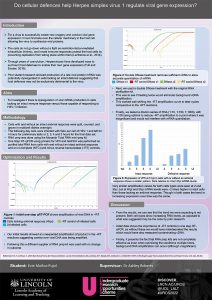
By Evie Muñoz-Pujol (Department of Life Sciences)
Supervisor: Dr Ashley Roberts
Herpesviruses are very common pathogens found in mammals, fish birds and reptiles. Human herpesviruses are responsible for symptoms like cold sores and shingles. However, just because they are common and often easily resolved does not mean they cannot be fatal, such as development of viral encephalitis.
Herpes simplex 1 (HSV-1), which causes cold sores, belongs to this family and over half the human population is infected by this virus. Over years of coevolution, HSV-1 has adapted ways to surmount the host’s antiviral response to allow it to replicate successfully. This means, in part, overcoming the restriction-factor-mediated intracellular and innate immune responses which are part of the defences the host puts up to hold off infection. However, this assumes these interactions are always detrimental. We compared two sets of cells, one with a fully functioning antiviral response and one lacking, using one step RT q-PCR on purified RNA to see if this was the case.
My project allowed me to work in an active research lab at the University of Lincoln as I worked alongside my academic supervisor Dr Ashley Roberts. I had the opportunity to work as ‘Student as Producer’ and was involved in the whole process of our research. From counting and infecting cells in a tissue culture lab, to the purification of RNA and setting up one step RT q-PCRs. With the aid of my supervisor, I developed many practical lab techniques used in research and diagnostics that would be difficult to acquire otherwise, all the while honing and enhancing my skills with more familiar techniques.
Not only did I gain technical skills and experience, but I developed an awareness as to what working in a research lab is like. I observed the amount of preparation and planning needed to produce results that you can be confident in. While working on our project, we faced challenges where optimisation was needed. The first q-PCR results showed an amplification where there should have been none. This allowed me to develop and use problem solving skills to find the optimal conditions to minimise this amplification after multiple additional tests.
In conclusion, the UROS experience has opened my eyes to what is possible through research and confirmed my interest in the field. Perhaps the most importantly for me, it solidified my decision to pursue a career in research.
*To view the research poster for this project, please click on the thumbnail below:
